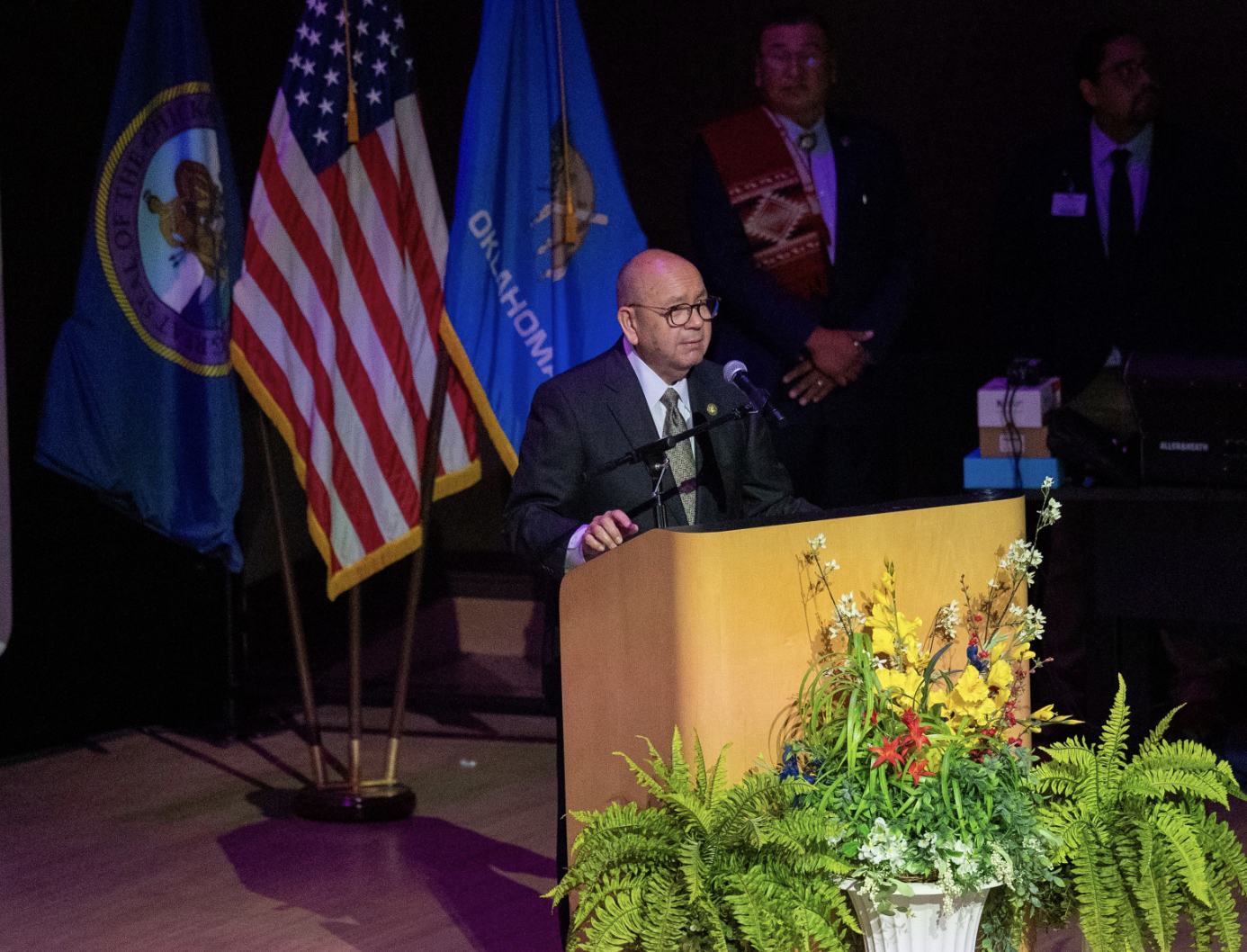
- Details
- By Chickasaw Nation Media
Many gathered at the Chickasaw Cultural Center in Sulphur, Oklahoma, Sept. 9, 2024, as Chickasaw Nation Governor Bill Anoatubby proclaimed the day as the “Chickasaw Day of Prayer.”
“Now, therefore, I, Bill Anoatubby, Governor of the Chickasaw Nation, by the virtue of the authority vested in me, do hereby proclaim Sept. 9, 2024, as the ‘Chickasaw Nation Day of Prayer’ in the Chickasaw Nation and call upon the Chickasaw people to come together as the unconquered and unconquerable Chickasaw Nation to honor God, to pray for our citizens and leaders, to reconcile past conflicts and injustices with others and among ourselves, and to humbly ask that God heal our land and our nation as a whole,” Governor Anoatubby said during the proclamation reading.
Spiritual leaders from the Chickasaw Nation and other tribes came together to lead the community in prayers for good health, peace, prosperity and protection.
The 11th annual ceremony began with a welcome by Chickasaw Nation Legislator Dusk Monetathchi. Monetathchi served as the master of ceremonies.
“God bless every one of you who are coming to celebrate this day of prayer with us as we recognize God’s grace and God’s mercy toward us and our families,” Monetathchi said.
Singers led by pastor Allen Beck of Sandy Creek Church sang hymns from the “Choctaw Hymns” book.
This year’s Chickasaw Day of Prayer theme was “Unity in the Bond of Peace.” Chickasaw Nation Medical Center Chaplain Pastor Randy Wade shared scriptures to support the theme.
"As Chickasaws we maintained our unity as a village, living and working together through humility, meekness and forbearance toward one another, that peace would abide and keep us strong as a people,” Wade said.
Melvin Battiest, member of the Muscogee Nation, played songs of unity on his courting flute. Battiest is the co-founder of the nonprofit organization Native Wings Like an Eagle. The organization provides essential assistance to First Americans reintegrating post-incarceration.
Pastor Larry Hawkins of Okchamali Blue Baptist Church in Connerville, Oklahoma, prayed for the leaders of the Chickasaw Nation and the United States. Hawkins is a Chickasaw citizen.
Chickasaw citizen Anoli Scott prayed for the youth and education of the Chickasaw people. Scott is a second lieutenant in the United States Air Force.
Chickasaw citizen Rose Shields-Jefferson recited a prayer for families and community in the Chickasaw language. Shields-Jefferson, a fluent Chickasaw speaker, has been influential in the continuation of the Chickasaw language by implementing new words and taking part in the creation of the Chickasaw Language Basics app. She is also a member of the Chickasaw Hall of Fame.
Wade closed the event on a note of gratitude for fellowship and unity.
“I thank all of you for coming and being a part of Chickasaw Day of Prayer,” Wade said. “It is good to gather again and see one another in such a capacity."
More Stories Like This
NCAI Passes Two Emergency Resolutions on Immigration Enforcement ActivitiesChickasaw Lighthorse Police Officer named Indian Country Law Enforcement Officer of the Year
Indian Gaming Association Rallies Broad Coalition Against Sports Event Contracts It Calls Illegal Threat to Tribal Sovereignty
Navajo Resources and Development Committee Issues Notice on Livestock Inspection Requirements
American Prairie, Tribal Coalition Files Protest Over Rescinded Grazing Rights
Help us defend tribal sovereignty.
At Native News Online, our mission is rooted in telling the stories that strengthen sovereignty and uplift Indigenous voices — not just at year’s end, but every single day.
Because of your generosity last year, we were able to keep our reporters on the ground in tribal communities, at national gatherings and in the halls of Congress — covering the issues that matter most to Indian Country: sovereignty, culture, education, health and economic opportunity.
That support sustained us through a tough year in 2025. Now, as we look to the year ahead, we need your help right now to ensure warrior journalism remains strong — reporting that defends tribal sovereignty, amplifies Native truth, and holds power accountable.
 The stakes couldn't be higher. Your support keeps Native voices heard, Native stories told and Native sovereignty defended.
The stakes couldn't be higher. Your support keeps Native voices heard, Native stories told and Native sovereignty defended.
Stand with Warrior Journalism today.
Levi Rickert (Potawatomi), Editor & Publisher
